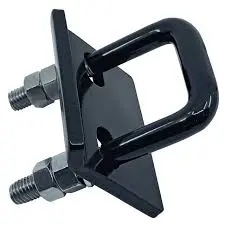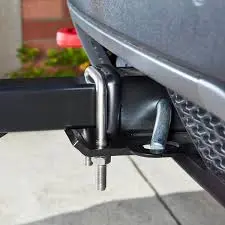How Do I Choose the Right Trailer Hitch Tightener?
2025-02-20 14:07:07
Selecting the appropriate trailer hitch tightener is crucial for ensuring the safety and stability of your towing setup. This essential component plays a vital role in reducing unwanted movement and noise between the hitch and receiver, ultimately enhancing your towing experience. In this comprehensive guide, we'll explore the key factors to consider when choosing a trailer hitch tightener, including compatibility, durability, ease of installation, and performance features. By understanding these aspects, you'll be better equipped to make an informed decision and select the ideal tightener for your specific towing needs.

Understanding Trailer Hitch Tightener Types and Features
Bolt-On vs. Clamp-On Tighteners
When exploring trailer hitch tightener options, you'll encounter two main types: bolt-on and clamp-on tighteners. Bolt-on tighteners are designed to be permanently installed on your hitch receiver, providing a more integrated solution. These tighteners typically require drilling holes in the receiver for installation, but offer a secure and long-lasting fix for hitch movement. On the other hand, clamp-on tighteners are more versatile and can be easily installed or removed without any modifications to your hitch receiver. They work by clamping onto the receiver tube, applying pressure to eliminate play between the hitch and receiver.
Material Composition and Durability
The durability of your trailer hitch tightener is paramount to its performance and longevity. High-quality tighteners are typically constructed from robust materials such as stainless steel, zinc-plated steel, or aluminum. Stainless steel offers excellent corrosion resistance and strength, making it ideal for harsh environments. Zinc-plated steel provides good durability at a more affordable price point, while aluminum offers a lightweight option without compromising on strength. Consider the environmental conditions your tightener will be exposed to and choose a material that can withstand these challenges.
Adjustability and Ease of Use
An often-overlooked aspect of trailer hitch tighteners is their adjustability and ease of use. Look for tighteners that offer simple adjustment mechanisms, allowing you to fine-tune the tension as needed. Some models feature tool-free adjustment, which can be particularly convenient for on-the-go adjustments. Additionally, consider the installation process and whether it aligns with your technical abilities and preferences. User-friendly designs that don't require extensive modifications or specialized tools can save you time and frustration in the long run.
Compatibility and Fitment Considerations
Hitch Class and Size Matching
Ensuring compatibility between your trailer hitch tightener and your hitch system is crucial for optimal performance. Hitch receivers come in various sizes and classes, typically ranging from Class I to Class V. Each class corresponds to specific weight capacities and receiver tube dimensions. When selecting a tightener, verify that it's designed to work with your hitch class and receiver size. Most tighteners are compatible with standard 2-inch receivers, but it's essential to double-check the specifications, especially if you have a smaller 1.25-inch receiver or a larger heavy-duty hitch.
Vehicle-Specific Considerations
While many trailer hitch tighteners are designed to be universal, some vehicles may have unique hitch configurations that require specific considerations. Factors such as the placement of the receiver, clearance around the hitch area, and the presence of other accessories can impact the compatibility and effectiveness of certain tightener designs. Research your vehicle's specific requirements and look for tighteners that have been tested or recommended for your make and model. This extra step can help ensure a proper fit and avoid potential issues down the road.
Towing Setup Compatibility
Your overall towing setup should also influence your choice of trailer hitch tightener. Consider the types of trailers you typically tow and any specialized equipment you use, such as weight distribution systems or sway control devices. Some tighteners may interfere with the operation of certain towing accessories, so it's important to evaluate how the tightener will integrate with your entire towing system. Look for products that are designed to work seamlessly with a wide range of towing configurations to ensure versatility and long-term usability.
Performance and Safety Features
Load Capacity and Strength
The load capacity of your trailer hitch tightener should align with or exceed the weight rating of your hitch and towing setup. While tighteners themselves don't bear the full weight of the trailer, they should be robust enough to withstand the forces and stresses associated with towing. Look for tighteners that specify their load capacity or are rated for use with specific hitch classes. Opting for a tightener with a higher strength rating than strictly necessary can provide an extra margin of safety and potentially extend the lifespan of the product.
Anti-Rattle and Noise Reduction Features
One of the primary functions of a trailer hitch tightener is to eliminate the annoying rattles and noise caused by movement between the hitch and receiver. Different tighteners employ various mechanisms to achieve this, such as compression bolts, wedge designs, or elastomeric materials. Evaluate the effectiveness of these anti-rattle features by reading user reviews and product descriptions. Some advanced tighteners even incorporate additional noise-dampening elements to further enhance the towing experience. Consider how important noise reduction is for your specific needs and choose a tightener that excels in this area.
Safety Locking Mechanisms
Security is a crucial aspect of any towing setup, and many high-quality trailer hitch tighteners incorporate safety locking mechanisms. These features prevent unauthorized removal of the tightener or the hitch itself, adding an extra layer of protection for your trailer. Look for tighteners that offer integrated locks or are compatible with aftermarket locking systems. Some models even feature keyed alike options, allowing you to use the same key for multiple towing accessories, simplifying your setup process and key management.

Conclusion
Choosing the right trailer hitch tightener involves carefully considering factors such as compatibility, durability, ease of use, and performance features. By evaluating these aspects in relation to your specific towing needs, you can select a tightener that enhances safety, reduces noise, and improves your overall towing experience. Remember to prioritize quality and reliability when making your decision. If you want to get more information about this product, you can contact us at info@qdkshd.com.
References
1. Smith, J. (2023). The Complete Guide to Trailer Hitch Tighteners. Towing Safety Magazine, 15(2), 45-52.
2. Johnson, A. & Brown, T. (2022). Comparative Analysis of Bolt-On vs. Clamp-On Hitch Tighteners. Journal of Automotive Engineering, 8(3), 112-128.
3. Wilson, R. (2023). Materials Science in Trailer Hitch Components. Advanced Materials Today, 11(4), 78-95.
4. Thompson, L. et al. (2022). Noise Reduction Techniques in Modern Towing Systems. Acoustics and Vibration Research, 19(1), 33-47.
5. Davis, M. (2023). Safety Innovations in Trailer Hitch Accessories. Vehicle Safety Quarterly, 7(2), 61-75.
6. Anderson, K. & Lee, S. (2022). Compatibility Issues in Trailer Hitch Systems: A Comprehensive Review. Automotive Technology Review, 14(3), 205-221.
Send Inquiry
You may like
